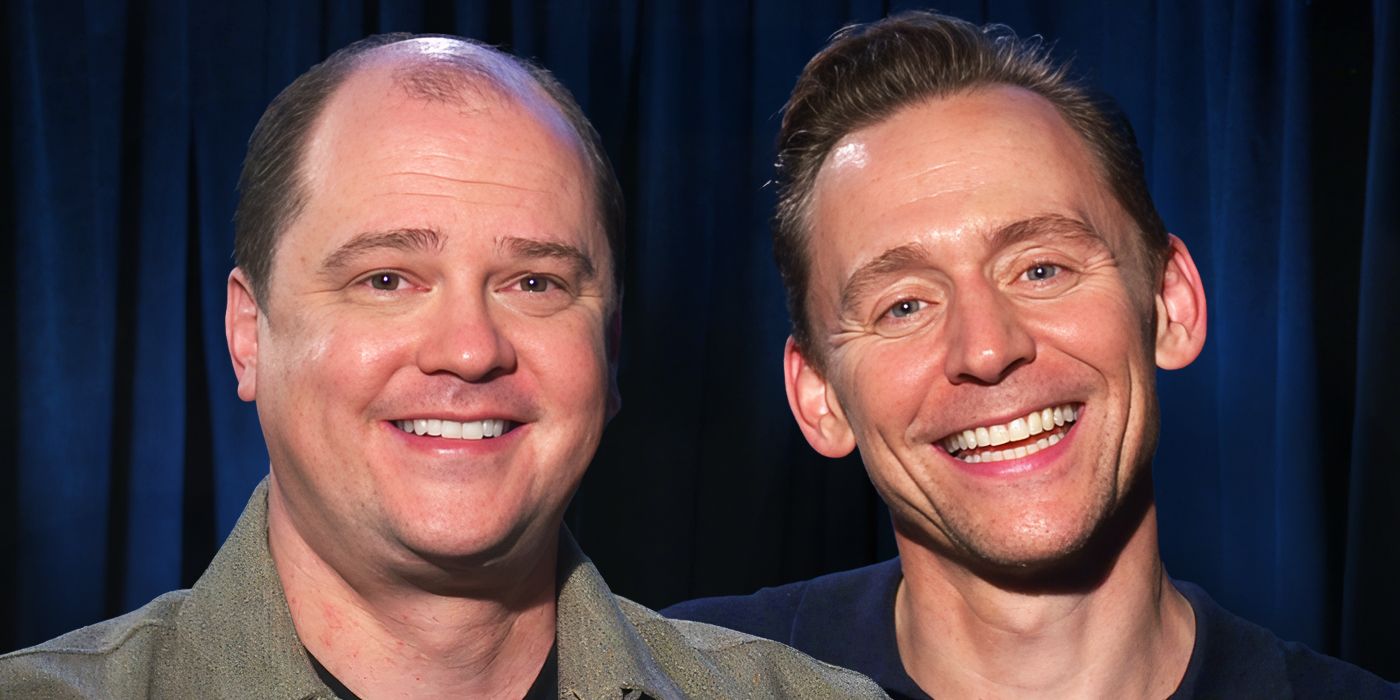It’s been nearly 15 years since Tom Hiddleston prowled onto pop culture’s biggest stage as Loki, the MCU’s original tragic villain and a role he’s continued to reprise (and refine). As Hiddleston’s obvious star power grew with each new Marvel installment, he spent those same years forging a successful career in a range of independent films. Whether it’s a tortured antihero in the historical Gothic romance Crimson Peak, a despondent musician vampire in Only Lovers Left Alive, real-life country singer Hank Williams in I Saw the Light, High-Rise‘s hedonist physician, or a conflicted priest in The Essex Serpent television miniseries, no fictional character seems immune to Hiddleston’s effortless charisma, dramatic insight, and gravitas. His essential qualities are arguably more evident now than ever after his turn in writer-director Mike Flanagan‘s The Life of Chuck, a critically acclaimed feature film adapting the Stephen King novella of the same name.
Although he can slide into any role as smoothly as tossing on a coat, Hiddleston, without fail, balances feral ferocity with vulnerability as acute as an open wound. His characters’ raging anguish always simmers underneath his self-assured exterior. That super-weapon of his ensures his performances are gripping, poignant, and unpredictable — and snagged Hiddleston the Golden Globe for Best Actor (Limited Series or Television Film) for the BBC’s The Night Manager, the six-episode adaptation of espionage writing legend John le Carré‘s 1993 novel. During the press tour for The Life of Chuck, Hiddleston sat down with Vanity Fair for their Rewatch series and shared an earnest anecdote about The Night Manager‘s impact — not on his subsequent career steps, but on one everyday viewer.
What Is ‘The Night Manager’ About?
Cairo hotel night manager Jonathan Pine’s (Hiddleston) quiet, controlled life changes for the worst when the alluring Sophie Alekan (Aure Atika) books a room. Even though they’re strangers, Sophie entrusts Pine with top-secret stolen papers indicting her wealthy criminal lover, Freddie Hamid (David Avery), as a chemical weapons distributor. Pine sends the documents to London’s International Enforcement Agency, where they catch the eye of Angela Burr (Olivia Colman), an intelligence agent hunting the notoriously untouchable arms dealer Richard Roper (Hugh Laurie) — an individual horrendous enough to earn the moniker “the worst man in the world.” Pine and Sophie act upon their mutual infatuation, but Hamid and Roper’s lucrative business relationship ensure the pair’s love affair is short-lived. When a source informs Roper about the leaked documents, Sophie is swiftly murdered. Her death devastates Pine, especially when the corrupt local police write the brutality off as a burglary.
Years later, an unexpected opportunity arises when Roper and his entourage — including his mistress, Jed (Elizabeth Debicki) — arrive at the Swiss hotel Pine now oversees. Despite his initial reluctance and his lack of espionage experience, the vengeance-driven Pine accepts Burr’s offer to join her sanctioned crusade against Roper. Rather than scramble from a distance for information only to watch Roper slip away again, Pine will — in so many words — make an in-person offer Roper can’t refuse. He assumes a new identity, infiltrates Roper’s inner circle, and navigates the tightrope of practicing enough charming brutality to endear himself to Roper without revealing his true intentions — all while falling for Jed, against both their better judgments.
‘The Night Manager’ Proves Tom Hiddleston Was Born To Play a Spy
In 2023, 11 years after it aired, BBC One and Amazon Prime Video renewed The Night Manager for a second season. As the crew filmed Season 2 in London, Hiddleston met the night manager of the hotel at which he was staying. The actor relayed the details to Vanity Fair:
“I drove up and parked my car and somebody came to meet me. And they were so enthusiastic, and I thought, you know, this is kind of extraordinary hospitality. And then, as he was showing me to my room, he said, ‘I just have to tell you, I became a night manager in hotels because I saw you in The Night Manager.”‘
Directed by Susanne Bier and co-starring Laurie and Colman’s respective acting prowess, as well as a star turn from Debicki years before her haunting portrayal of Princess Diana in The Crown, The Night Manager is a sleek, suspenseful psychological thriller that erases any doubt about Hiddleston’s capacity to play a wide range of leading men. He steps into the ambiguity, intensity, and enticingly enigmatic mood the genre requires like it was constructed for him (or vice versa). Roper’s second-in-command, Corky Corkoran (Tom Hollander), neatly summarizes Pine’s appeal when he describes the man as a “human hand grenade.” Already accustomed to the people-pleasing of a public-facing night manager — composed, polite, and seemingly harmless — even the world’s nicest can’t conceal Pine’s rage as a grieving lover.
10:38

Related
The duo also discuss the casting process and how Hiddleston relates to the Stephen King character.
When that intensity doesn’t have an outlet, it manifests in Pine’s livid stare, his twitching jaw, or the restraint with which he holds his coiled muscles; when he can indulge his fury, bloodshed comes naturally to him. Pine is the kind of undercover agent who sacrifices his moral center and abandons his existing life for a cause, but his motivation happens to be personal vengeance, not altruism. Although it’s a familiar narrative set-up, Hiddleston’s eye for human detail excavates the trope until it’s compelling again. Pine plays a multi-layered pretense until he lives the lie as naturally as a second skin — although unspoken moments imply the character’s emotional remove has existed since before The Night Manager begins.
Tom Hiddleston’s Layered Performance Balances Vulnerability and Ferocity in ‘The Night Manager’
Like many performers who commit themselves to an immersive, gritty spy thriller, Hiddleston employs the acting trick of a character upholding a facade while making slight gestures, involuntarily or purposefully, that cue the audience into what they really mean. Pine keeping his mask intact becomes especially difficult once every accumulating factor turns into an overstuffed house of cards. Obtaining information for Burr, reeling in Roper’s trust like a fish on a hook, and developing feelings for Jed is playing with a dangerous, ill-advised fire.
Just as frightening as Roper’s potential wrath about Pine and Jed’s attraction, however, is the tender fragility required to admit one’s loneliness and reach out to an understanding soul. Bier’s direction is a perfect match for Hiddleston’s most finessed qualities, emphasizing tell-tale beats like uncomfortable pauses, clenched fists, fingers romantically grazing another’s knuckles, and guilty eye movements. Within those tense pauses lies the weight of maintaining a false identity while trapped in the belly of Roper’s beast — the same beast Pine has let transform him into a quasi-monster, if it means sating his vengeance.
Over The Night Manager‘s six episodes, the blade that is Pine’s fury never rusts, but with Jed, he reverts to the protective affection he showed Sophie. This man does care; his crusade starts with his doomed love affair. If the eyes are the window to the soul, then Hiddleston illuminates his character’s soul as clearly as if he projected the multiplicity onto an IMAX-sized screen: melancholy, ferocity, determination, fear, and compassion slipping free when Jed sneaks through the cracked armor he believed he’d forged into impenetrability. Hiddleston told Vanity Fair that le Carré gave the actor his blessing to play Pine, the author’s fictional avatar, in whatever way Hiddleston saw fit. He more than carries the series, staking his claim as a compelling protagonist while matching technique and wits against a magnificent Colman, a tormented, resilient Debicki, and a chilling Laurie.
Tom Hiddleston’s Real-Life Impact With ‘The Night Manager’ Highlights the Power of TV
Without getting too sentimental, encountering a certain piece of media at the right time can change anyone’s life. Noteworthy examples include Mae Jemison, the first Black woman astronaut, who was inspired by Nichelle Nichols‘ powerful presence in Star Trek: The Original Series. There are just as many non-celebrity stories the public will never know: individuals who joined the entertainment industry because a movie seized their imagination and never let go, or who become frontline healthcare workers thanks to medical dramas — the list goes on. The passionate, heartfelt enthusiasm of Hiddleston’s London hotel manager perfectly illustrates how a particular work can direct someone onto a path they otherwise wouldn’t have pursued. “Each project is such a unique and specific chapter of my life,” Hiddleston went on to reflect. In The Night Manager Season 1’s case, it also turned the pages of a chapter in a stranger’s life. If that isn’t why art matters, then what is?



